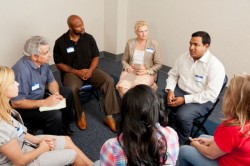
Addiction, according to the NIDA, “is a complex brain disease characterized by compulsive, at times uncontrollable drug craving, seeking, and use despite devastating consequences.” It’s a disease that affects the entire family and usually the addict is the one who gets the most out of the situation through manipulative behaviors that instill worry, powerlessness, and fears in the people who care about them the most.
Co-dependency is a phenomenon that many people do not understand and loved ones are often in midst of an uphill battle to take care of their own basic needs, let alone having to deal with the guilt, anger, embarrassment, and other despairs that their loved one’s addiction can cause. Control is not an option and enabling is not an option either. Learning how to stop being codependent to help your loved one with their addiction is the only viable option.
Let Go of the Pain
Addicts can become very selfish in their addiction causing pain to their children, spouse, parents and other loved ones, but, their pain is obliterated by the use of the drugs or alcohol if only for a short time. You must seize the opportunity to let go of the pain by blocking out the feelings of anger, frustration, isolation, mistrust, and guilt. The more often your can avoid these emotions, the more peace and focus you will find for yourself.
More often than not, you will need support to help you do this because it’s only natural to want to take care of the people you love, but, you are not helping the addict by hurting yourself. Once you realize that your own wellbeing is important you’ll begin to set the boundaries that keep you strong and able to stop being codependent.
Educate Yourself
Learn about addiction and the co-existing implications of the associated behaviors. The more you know, the less manipulative the addict can be over you. When they give you a sob story about being broke or needing some type of relief, you need to be aware of these manipulative situations and know how to stand your ground. Most codependents will try to avoid the confrontations and maintain peace by giving the addict what they demand, but, education empowers and soon you will have the tools you need to take the next step in helping your loved one with their addiction.
Attend Group Support Meetings

Try attending a support group with your loved one.
Attend Nar-Anon or AL-Anon family groups to get with people who know a little bit about addiction. These groups are notable for their honesty, knowledge, and concern for the recovery of others undergoing similar circumstances with their addicted loved ones. The groups provide support, insights, experiences, literature, and are voluntary and available for spouses, teens, parents, and grandparents. Building positive and encouraging relationships and following 12 step programs are recommended practices in substance abuse treatment and for those who need to recover from the effects of living with an addicted relative or friend.


